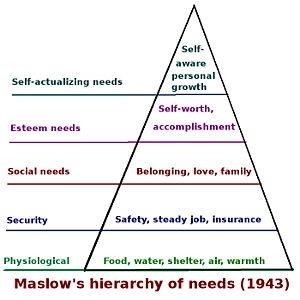“Maslow’s hierarchy of needs is a motivational theory in psychology comprising a five-tier model of human needs, often depicted as hierarchical levels within a pyramid. Needs lower down in the hierarchy must be satisfied before individuals can attend to needs higher up. From the bottom of the hierarchy upwards, the needs are: physiological, safety, love and belonging, esteem, and self-actualization.”¹
We don’t have to be experts on Maslow’s pyramid to understand the basics of human survival. We know we need food (and water), clothes, and shelter. In the United States, we are blessed with plentiful and affordable access to quality food, clean water, and clothes. Our risk level for not having these basics of survival thankfully is quite low. However, when it comes to shelter, more often than not, we live in a constant state of extreme risk.
In the United States, most us either mortgage or rent our shelters. In the event our income stops flowing or is reduced, many of us will not be able to make the mortgage or rent payments for very long. When we stop making mortgage or rent payments, the lender will foreclose or the landlord will evict, and we will lose our shelters. Every day that we don’t own our shelters outright is a day that we put ourselves and our loved ones at risk of not having one of the most basic needs of survival.
Maslow placed Self-actualizing Needs and Esteem Needs at the top of his pyramid. Once our basic needs are met, we can more fully focus on our personal growth and our sense of self-worth, according to Maslow. Perhaps one reason the self-help industry in the United States is booming is that so many of us want to jump to the top of the pyramid without laying a solid foundation at the bottom of the pyramid. We seek answers for our pain and relief of our stress as we struggle with cognitive dissonance, knowing that our status as mortgagors or renters puts a basic need of our survival in jeopardy, and yet we keep borrowing or we keep renting.
We try to convince ourselves that a loan over thirty years is normal and even good or that the convenience of renting makes it worth it. However, deep down, maybe even buried in our subconsciousness, we know we would rather have the security–and the freedom–of outright shelter ownership.
Alas, our foundations are weak. We refuse to humble ourselves to live within our means. We refuse to chip away systematically at our dependency on lenders and landlords. Instead, we borrow more and spend more than is necessary and perpetuate our insecurity. Our lives are out of balance. While pursuing Self-actualizing Needs and Esteem Needs is important, focusing on these areas will be much more fruitful when we can say, “As is my shelter, so is my mind: Free and Clear!”
P. Gustav Mueller, author of The Present
Relevant Link
¹ Maslow’s Hierarchy of Needs, by Saul Mcleod, The University of Manchester
